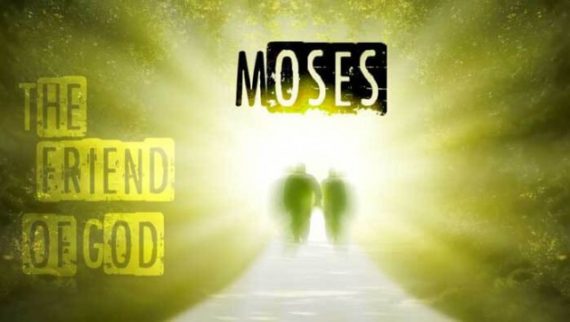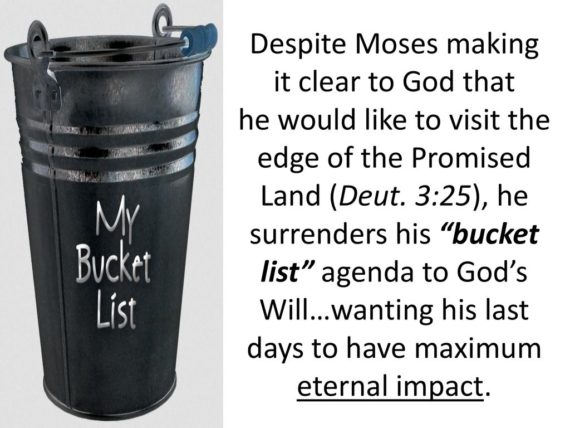
Most of us who have studied the life of Moses know that he never entered the promised land. God didn’t permit it. At first glance this may seem harsh. But was this decree really a display of God’s grace?
“Then the Lord said to him, ‘This is the land which I swore to Abraham, Isaac and Jacob saying, “I will give it to your descendants.” I have let you see it with your eyes, but you shall not go over there.’ So Moses the servant of the Lord died there in the land of Moab, according to the word of the Lord” (Deuteronomy 34:3-4).
The fact that Moses was not allowed to enter the promised land always troubled me. In my finite mind I found myself thinking that the situation which transpired at the end of his life and ministry seemed unfair.
After all Moses was a great prophet who accomplished great things and performed miracles as God’s instrument. Was God being unreasonable? Finally, I came to realize that perhaps Moses was not permitted to enter the promise land as a result of God’s grace.
“For who has known the mind of the Lord, or who became His counselor” (Romans 11:34a)?

Needless to say, God’s purposes for prohibiting Moses from entering the promised land are surely multilayered. As Isaiah so perfectly states, “For My thoughts are not your thoughts, nor are your ways My ways, says the Lord” (Isaiah 55:8).
The majority of us know about the incident at the waters of “Meribah Kadesh” recorded in Numbers 20. Much has been written and said about the sin of Moses. However, that is not my focus today.
God’s grace is the one aspect that I hope to convey in this post. Thus for starters here’s just a brief overview of the character of Moses:
Faith – Beginning with the burning bush experience Moses grew in his faith to become a mighty leader of his people.
Prayer – He was a great man of prayer with total dependence upon God
Humility – “Now the man Moses was very humble, more than any man who was on the face of the earth” (Numbers 12:3). This scripture speaks for itself.
Courage – Now the challenges Moses faced when confronting Pharaoh, the wilderness experiences, rebellion of the Israelites, etc. seemed insurmountable. He had great courage as he trusted God step by step to see him and his followers through.
Relationship with God – “Thus the LORD used to speak to Moses face to face, just as a man speaks to his friend” (Exodus 33:11a). Again the scripture speaks for itself.

Near the end of the book of Deuteronomy, it is written that, “No prophet has risen in Israel like Moses, whom the Lord knew face to face” (Deuteronomy 34:10).
Not only did Moses typify Godly character, he was called a friend of God. So the question remains why was he not permitted to enter the promised land?
Although Moses was still physically able (Deuteronomy 34:7), was God delivering an old man from more difficult challenges by handing the mantle to Joshua, a younger man who was equipped to take on new challenges? Was this a manifestation of God’s grace? I believe so.
Moses had a strenuous life as he led a nation that was wrought with many problems. Entering the promised land ensued many more challenges.
Furthermore, Moses finished the work which he was called to do. God was ushering him home because God’s purposes for his earthly life were completed. As Jesus stated in Matthew, “Well done good and faithful servant” (Matthew 25:23).

Another essential point is that the life and times of Moses were in God’s hands, just as our times are in his hands. Also, let’s keep in mind that our heavenly Father, the O
“Let me, I pray, cross over and see the fair land that is beyond the Jordan” (Deuteronomy 3:25a).
Moses implored the Lord to cross over the Jordan. Now he was, under God’s direction, permitted to see it. He ascended Mt. Nebo, viewed the land of Canaan and died.
Then God seized him up to the real Promised Land, heaven, to be with Him for eternity (2 Corinthians 4:8 – “To be absent from the body is to be present with the Lord”).
As it turns out 1500 years later Moses and Elijah appeared at the transfiguration with Jesus. Therefore, Moses literally entered the promised land. Peter, James and John are eyewitnesses to this account (Matthew 17: 1-3).
Perhaps the prayer of Moses and his heart’s desire to literally enter the Promised land was granted. But it was granted according to God’s timetable. This is something we can only speculate on. But, more importantly, this stresses the importance of believers gaining an eternal perspective.
“And the Lord said to me, Enough! Speak to Me no more of this matter” (Deuteronomy 3:26b).
Now the Lord did not listen to Moses because He knew what was best for Moses. Meanwhile Moses did not question God, or complain.

Instead Moses continued in obedience to God’s command to mentor Joshua as the one who would lead the Israelites into the promised land.
The scriptures states that the Lord buried Moses (Deuteronomy 34:6). Now this is a beautiful representation of God’s loving hand upon His servant Moses. My point, however, is that God’s love, compassion and mercy never changed toward Moses.
Hence we need to put on our eternal spectacles and entrust God with unanswered or delayed answers to our prayers. We need to be grateful when God does not listen to us, or grant us all our desires which may not line up with His will.

In addition, there are things He does not want us to have because they may not be what’s best for us at a particular time in our lives. God, and only God, can see the complete picture of our lives in view of His eternal timetable.
In retrospect we can all look back on the times we have implored God for something we wanted, or thought was so terribly important. We may now realize God didn’t give us what we wanted because it would’ve created unnecessary challenges, or it could’ve been a total disaster.
This is a clear display of God’s grace towards us. However, we cannot see it at the time.
To sum up, we may never attain a particular goal, or see all our desires fulfilled as we exit this life. Even though our goals and desires may appear good or right, God may not permit it.


Hi Aida
A great perspective on why we dont get everything on our “bucket list” so to speak.
How much God loves us; in essence He knows what’s best for us.
Louann